Earlier this year, the Phoenix-based "Nedal" band Okilly Dokilly, an outfit whose members all dress like Ned Flanders from The Simpsons, had something unexpected happen. The long-running cartoon's producers called the band and asked if they could play their video for "White Wine Spritzer" over the credits on the episode "I'm Just A Girl Who Can't Say D'oh." Okilly Dokilly were going to be on the actual Simpsons, a dream come true for a parody band that risks copyright infringement simply by existing. "I feel humbled, proud, and somewhat liberated. Almost like I'm wearing nothing at all," band leader Head Ned told Phoenix New Times after the episode aired. "I think when we get back home, we might just take a drive up to Vegas and celebrate with a white wine spritzer."
Best Music Festival
FORM at Arcosanti
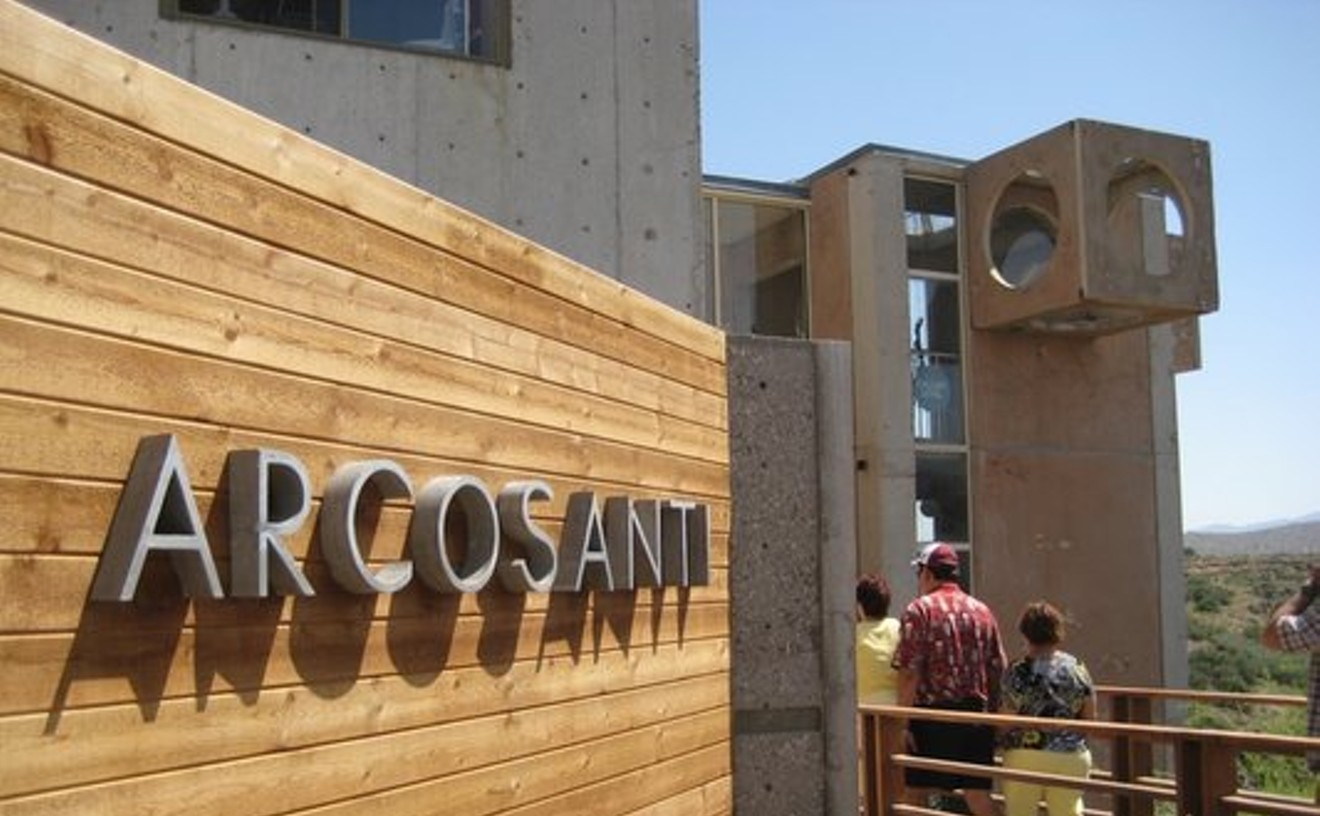
In 1970, Italian architect Paolo Soleri broke ground just 70 miles north of Phoenix on a vision of an alternative habitat for people who were intrigued by his philosophy of building an environmentally conscious "urban laboratory" that amalgamated architecture and ecology — a concept termed "arcology" by Soleri. This community, which he called Arcosanti, is the perfect setting for musicians, poets, artists, and fans to come together under the dazzling desert sky for a weekend of camping, dancing, and learning. FORM addresses some of the most frustrating parts of attending a music festival — camping and toilet conditions, obtrusive stages, overlapping set times, crowds — and corrects for them all. Every stage is set within the exquisite architecture that makes Arcosanti the otherworldly place that it is. The intimacy of the stages, set under ornately designed concrete apses, makes for a palpably connected experience for the fans and artists alike. FORM is what other music festivals purport to be by simply existing within its own means. Throughout each day, guests have the opportunity to enjoy every single set because there are no overlapping set times, allowing attendees to see the stunning range of performing artists. In 2019, attendees saw Fred Armisen perform a musical comedy set, the Russian anarchists Pussy Riot, and Florence Welch (of Florence + the Machine) interview the celebrated poet Yrsa Daley-Ward, all in the same weekend.
- 13555 S. Cross L Rd., Mayer, 86333 Map
- 928-632-7135
- www.arcosanti.org
Best Music Festival That Never Happened
Unity Summit Music Festival
The Unity Summit Music Festival promised to be the "biggest splash in recent Arizona music history" last November. Everything was supposed to go down at Mesa's Scarizona Scaregrounds and 10 satellite locations throughout the Valley, with tickets running anywhere from $75 to $1,200. But a lineup that justified the ticket price was never announced. Instead, an event took place at a pizza place in downtown Mesa. Mellow Man Ace, DJ Rectangle, and Iakopo were at the top of the bill. When competing documentary crews eventually descend upon the east Valley to investigate our state's version of the Fyre Festival, they'll find chaos behind the scenes. Stages were never built. While we never heard from anyone who ponied up $1,200 for a ticket, ultimately the vendors and performers paid the price: A lawsuit was filed against one of the co-founders in March for failing to return a deposit to the vendor.
Best Homecoming
decker.
Brandon Decker, who records and tours as decker., moved to the San Francisco Bay Area last year. Judging from his tour schedule, you would had never known he left. The songwriter, who now has moved back to Sedona, returned on numerous occasions with his band to play his heart out, including a compelling performance at Last Exit Live in May for a forthcoming live album (his cover of Leonard Cohen's "Famous Blue Raincoat" brought some members of the audience to tears). The music scene felt a little emptier without him, which is why we were ecstatic that the rumors that he was coming back for good were true. Welcome home.
Best Bar
Crescent Ballroom
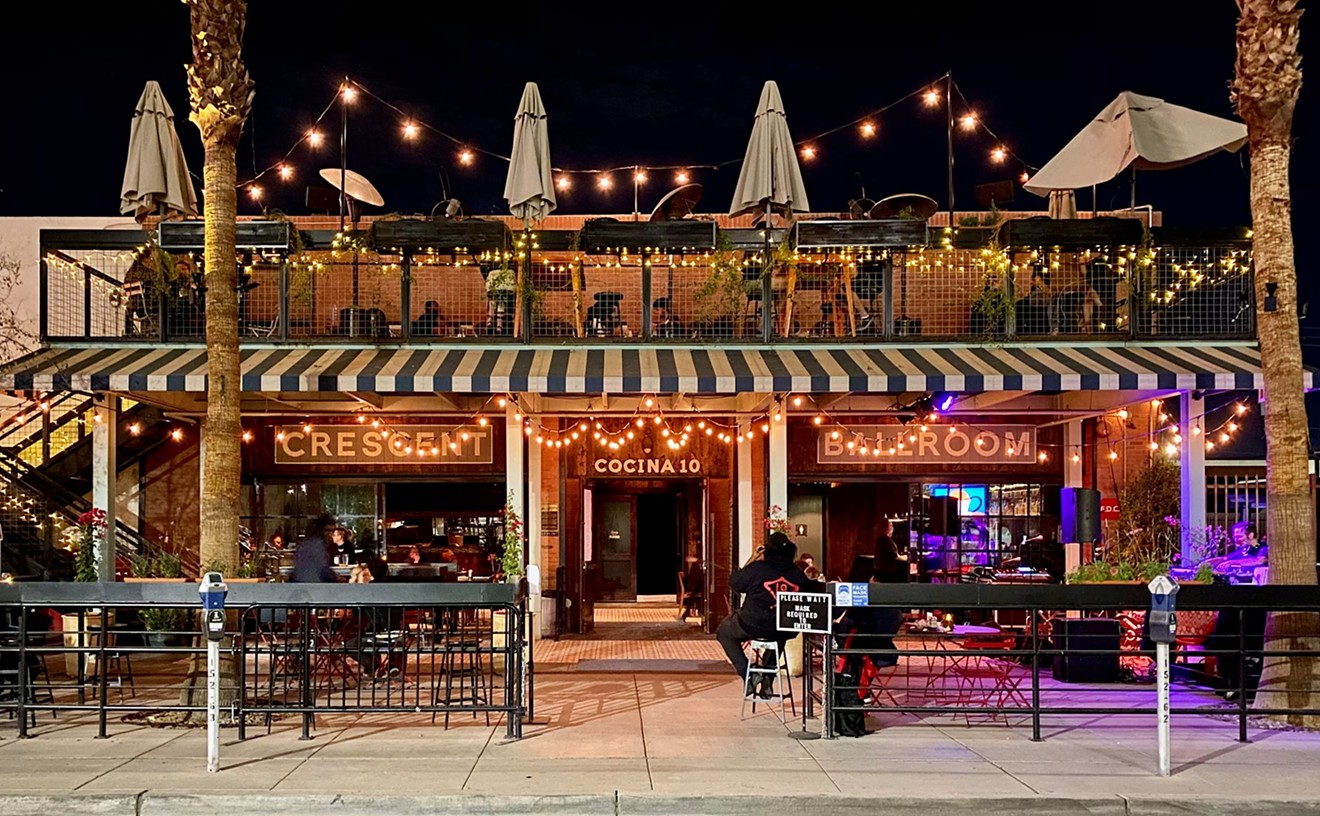
Crescent Ballroom may be first thought of as Charlie Levy's intimate music venue, but the front lounge, patio, and balcony operate as its own bar and eatery. The restaurant, otherwise known as Cocina 10, serves burritos, tacos, and other Arizona road food, while the full bar kicks out beer and wine (spot the Arizona brands by the cactus icon next to the menu item), as well as specialty cocktails. Try house drinks like the Rest Stop, La Ultima Palabra, or the beloved Honey Badger. During happy hour — 3 to 6 p.m., Monday through Friday — that Honey Badger is on special. Crescent Ballroom's location is ideal as well. It's found downtown, within walking distance of Arizona State University, other bars, and many an office building, but just far enough away from the high-rises to provide a stunning view of the skyline from the second-floor balcony.
- 308 N. Second Ave., Phoenix, 85003 Map
- 602-716-2222
- www.crescentphx.com
Best New Bar
Thunderbird Lounge
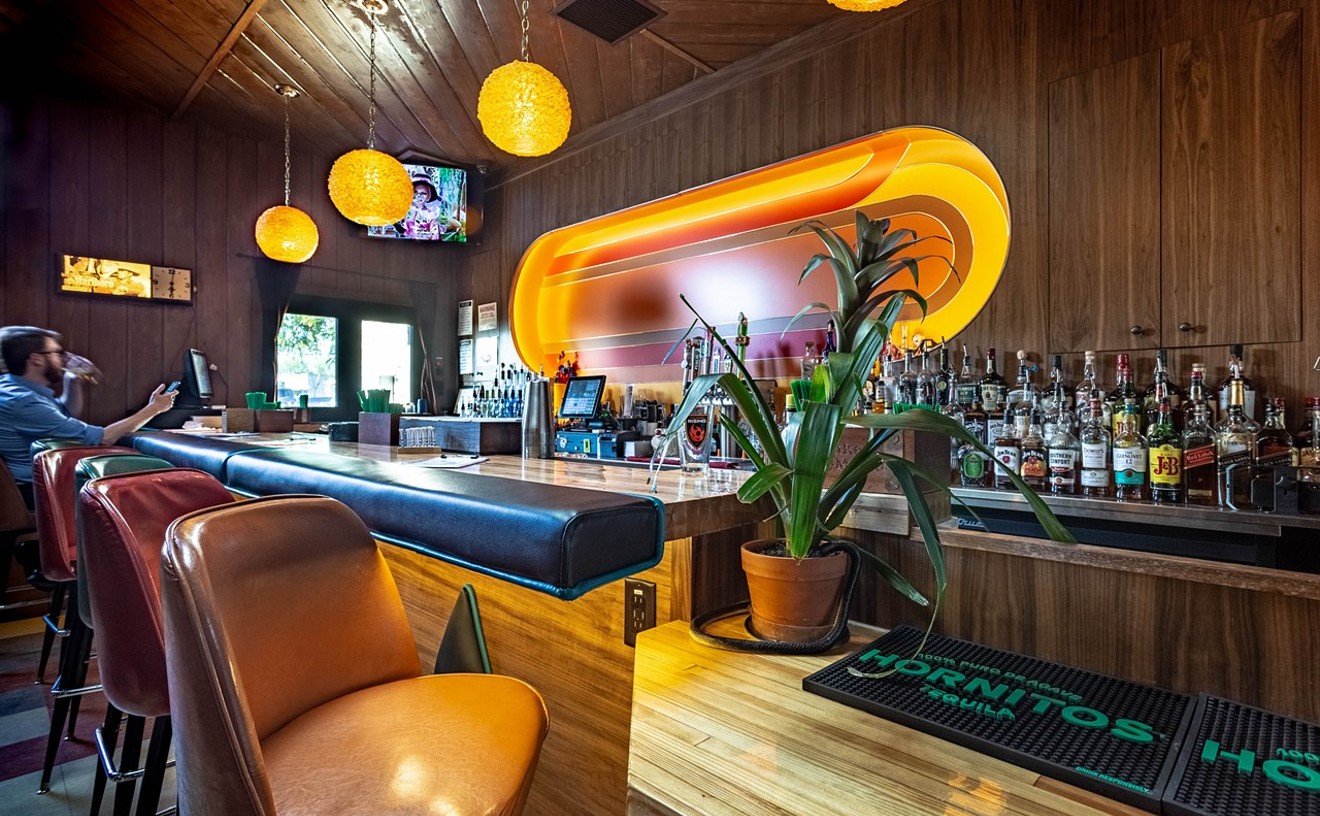
Since April, Thunderbird Lounge has operated in the last slot of the Melrose District's historic Wagon Wheel Building. The new neighborhood bar shoots for a 1970s Midwestern tavern vibe, and its three owners/friends seem to have accomplished this. The amenities are the best part: The ATM dispenses singles and fives for the jukebox and cigarette machine, and there's wood-fired pizza made in the backyard-style patio by Dino's Napoletana (part of the neighboring Restaurant Progress team). The arcade machines are set to free play all day, and there are endless supplies of Montucky Cold Snacks, RC Cola, Jay's Potato Chips, and O-Ke-Doke popcorn. Guests also can expect happy hour specials and themed evenings.
- 710 W. Montecito Ave., Phoenix, 85013 Map
- 602-283-4621
- thunderbirdloungephx.com
Best Nightclub
Monarch Theatre
Typically, nightclubs come and go as times, tastes, and trends change. Monarch Theatre, however, has not only survived the past seven years, but thrived, becoming the reigning king of downtown Phoenix's dance-club scene. And it's done so by constantly evolving over time, whether it's adding new amenities like its popular upstairs Scarlet Lounge in 2016, appealing to a wide cross-section of clubgoers with a variety of genres (from bass-heavy EDM and deep house to Latin sounds), or featuring high-energy club nights like the weekly Ikonik Fridays and Saturnalia seshes. Monarch's owners (the trio of local entrepreneur Edson Madrigal and local DJs Peter Salaz and Senbad) sprang for a major remodel, adding high-style amenities to the 7,000-square-foot main room and other parts of the two-story property. There are always challengers to the throne, especially in an often cutthroat scene, but for the moment, it's good to be the kings.
- 122 E. Washington St., Phoenix, 85004 Map
- 602-456-1991
- www.monarchtheatre.com
Best New Nightspot
The Hot Chick
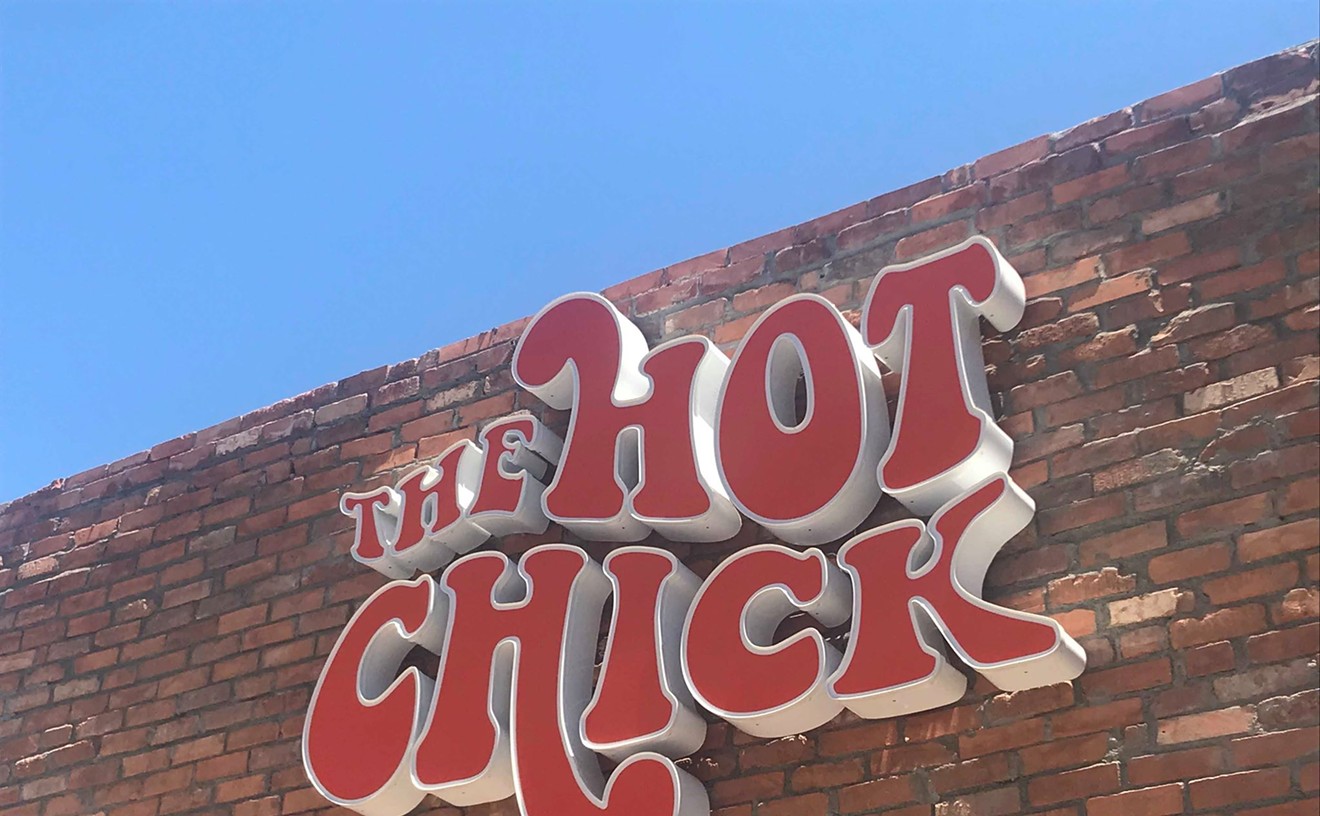
It's the eternal struggle for any new bar, restaurant, or nightspot: How do you find a hook that grabs people's attention and — more importantly — gets them in the door? The people behind Scottsdale nightspot The Hot Chick believe the way to do it is with a cute name, some retro flair, classic arcade games, and plenty of fun. And so far, they haven't been wrong. Since opening over the summer, the joint has been packed with people who have come to drop tokens into games like Frogger, Donkey Kong, and Galaga while soaking up the late '70s/early '80s vibe (think Dazed and Confused meets Boogie Nights). They've also come to dance, as The Hot Chick's rotating lineup of DJs has been getting bodies moving with an array of classic rock, disco, Motown, glam, and old-school hip-hop songs mixed in with more modern tracks. We've even seen The Hot Chick go wild when DJs have played "YMCA" by the Village People, including patrons spelling out the letters during the chorus, just like dancers have done for ages. It's nice to know that the more things change, the more they stay the same.
- 4363 N. 75th St., Scottsdale, 85251 Map
- 480-550-7819
- www.thehotchickaz.com
Best Dance Night
BFF Fridays at Bar Smith
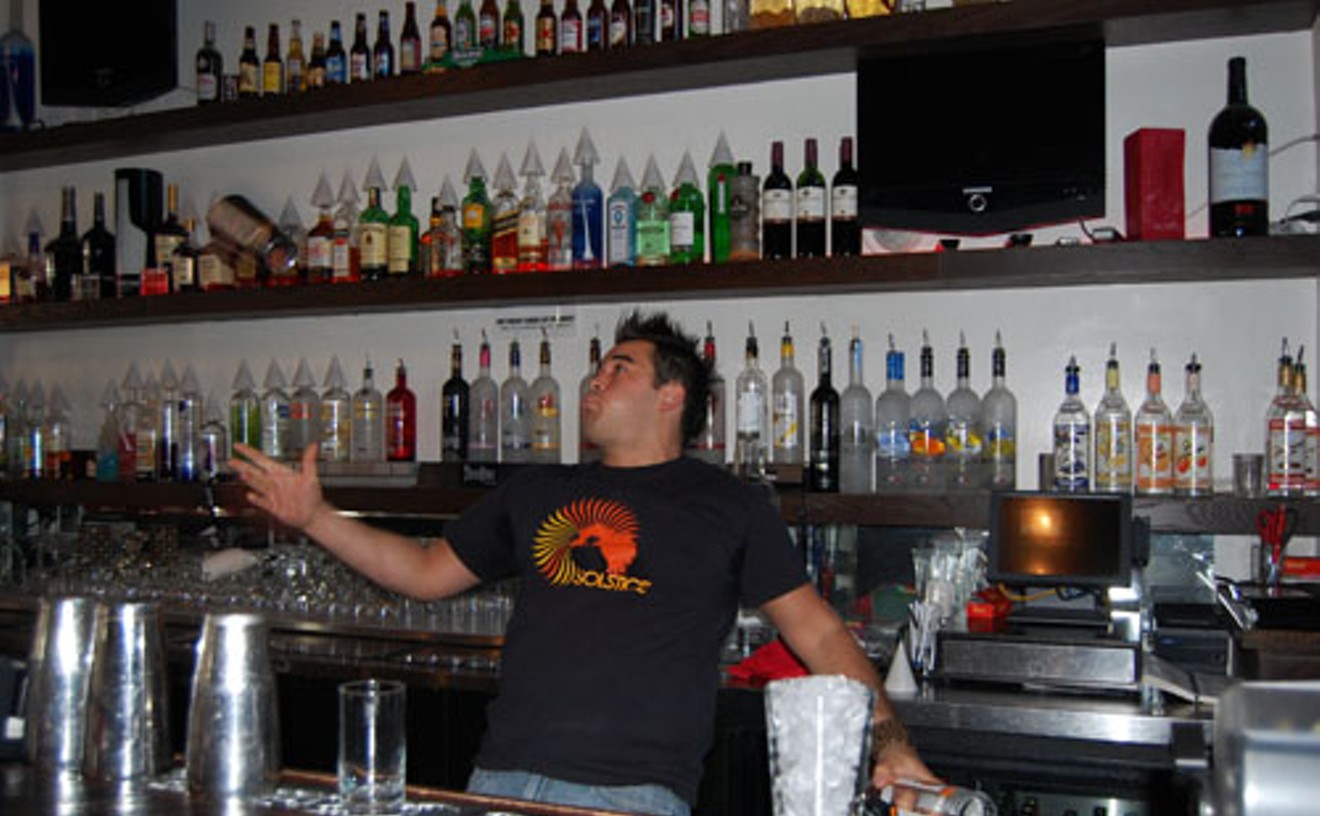
To most people, the term "BFF" stands for "best friends forever." At Sean Watson's Friday night dance affair, BFF, the acronym could mean anything, depending on the whims of its DJs. "We've had all these different names for it," Watson says, laughing. "It's been Big Fun Fridays, Best Friends Forever, or even Big Fucking Fantastic. We've changed it up a bunch of times." The name isn't the only thing that's changed at the event, which has gone down at Bar Smith almost every weekend for six years. BFF's soundtrack, setting, and DJ lineup constantly have evolved, going from a house and techno night on the venue's rooftop to a diverse dance party on both floors of the club with a mix of local DJs. (Watson, Cormac, and Klu are its current residents.) "We started getting into deeper stuff, indie dance, and future bass," Watson says. "And then downstairs has everything now: trance nights, bass nights, underground stuff ... all these different genres." One constant, though, has been the vibe. "It's always been this intimate experience where you're always close with other people, everyone knows your name, and everyone's dancing together and having a good time," Watson says. You know, just like some BFFs.
- 130 E. Washington St., Phoenix, 85004 Map
- 602-456-1991
- www.barsmithphoenix.com
Best Goth Dance Night
LILITH at Stacy's
For nocturnal dance fiends looking to sink their fangs into a dark groove on a weekly basis, LILITH is the place to be. Over the last few years, DJ Tristan Iseult has hosted a no-cover goth night at Stacy's @ Melrose. The event, like the venue itself (formerly known as Sanctum), has gone through name changes over the years. It was called Sour Times, but Iseult has rechristened his dance party with the name of the great-great-great-great-great-grandmother of goth: Lillith, first wife of Adam, and mother of all things that go bump in the night. Going to a LILITH night, it's plain to see why this Wednesday show has been a late-night Valley staple for so long. The place is regularly packed, the venue's general decor and ambience fit the music perfectly, and DJ Tristan brings the jams. His sets run the gamut of dark music, going from the early post-punk days to modern acts like Cold Cave and Tamaryn. And while you can expect to hear a few familiar gems each time, Iseult varies his music constantly, so you can always expect to get a few new earworms stuck in your head after a night of getting your goth-stomp on at LILITH.
- 4343 N. Seventh Ave., Phoenix, 85013 Map
- 602-264-1700
- stacysatmelrose.com/




